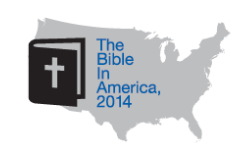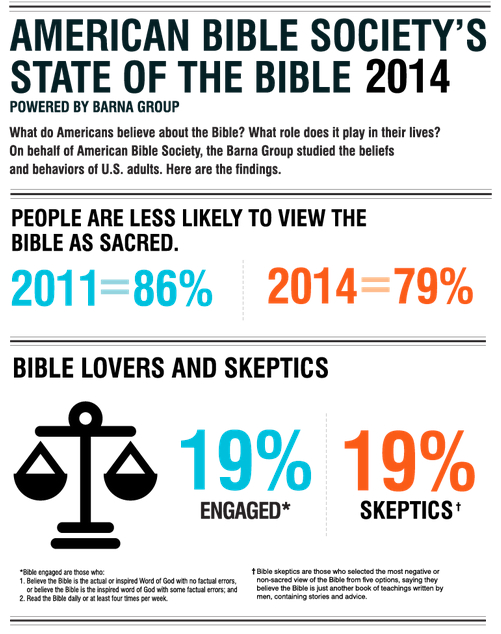The Bible in America 2014 - State of the Bible
America is Still Generally Pro-BIble, but Bible Skeptics now Balance out the Bible Engaged
Younger Generation Leads the Way in Bible Skepticism; American Bible Society Releases Findings in Its Annual State of the Bible Report
After four years of research, American Bible Society has found the Bible landscape in the U.S. is shifting.
 A new report released today finds the percentage of Americans who are considered “Bible engaged” is now equal to the percentage who do not believe the Bible to be sacred—both at 19 percent. The latest findings are in American Bible Society’s fourth annual State of the Bible survey. Since 2011, this latter category of “Bible skeptics” has risen from 10 percent to 19 percent of those surveyed. During the same period, the percentage considered “Bible-friendly” dropped from 45 percent to 37 percent, while “Bible-engaged” remained steady. The percentage of those considered neutralv toward the Bible, 26 percent in 2014, has remained statistically unchanged. The report, conducted by Barna Group, details Americans’ beliefs about the Bible, its role in society, its presence in U.S. homes and other information about the best-selling book of all time. As in previous years, the survey found the Bible remains a highly valued, influential force in America. But beliefs about the Bible and its role in society are becoming increasingly polarized—particularly when the data are examined by age group.
A new report released today finds the percentage of Americans who are considered “Bible engaged” is now equal to the percentage who do not believe the Bible to be sacred—both at 19 percent. The latest findings are in American Bible Society’s fourth annual State of the Bible survey. Since 2011, this latter category of “Bible skeptics” has risen from 10 percent to 19 percent of those surveyed. During the same period, the percentage considered “Bible-friendly” dropped from 45 percent to 37 percent, while “Bible-engaged” remained steady. The percentage of those considered neutralv toward the Bible, 26 percent in 2014, has remained statistically unchanged. The report, conducted by Barna Group, details Americans’ beliefs about the Bible, its role in society, its presence in U.S. homes and other information about the best-selling book of all time. As in previous years, the survey found the Bible remains a highly valued, influential force in America. But beliefs about the Bible and its role in society are becoming increasingly polarized—particularly when the data are examined by age group.
Overall, Millennials (ages 18–29) are driving the shift toward Bible indifference. Among Millennials, the 2014 State of the Bible survey found:
Nineteen percent believe no literature is sacred (compared to 13 percent of all adults), while 64 percent believe the Bible is sacred literature (compared to 79 percent of all adults).
Thirty-five percent believe the Bible contains everything a person needs to know to live a meaningful life, as compared with 50 percent for all adults.
While 50 percent of all adults believe the Bible has too little influence in society, only 30 percent of Millennials express the same belief. By way of comparison, 61 percent of Elders (those 68+) surveyed said they believe the Bible has too little influence in society.
Thirty-nine percent of Millennials never read the Bible, as compared to 26 percent of all adults.
“With four years of data from American Bible Society’s State of the Bible research, we are now able to see trends in attitudes about and behaviors around the Bible,” said Roy Peterson, president and CEO of American Bible Society. “The increasing polarization in attitudes about the Bible has implications for us as a nation and for our churches and families.”
Peterson, who took the helm of American Bible Society in February, believes there is reason to hope for an upswing in Bible engagement in the future.
“American adults, young and old alike, overwhelmingly recognize a moral decline is taking place in the nation,” said Peterson. “As they seek solutions, we hope they will find the Bible as the guidebook that can reverse the decline and help its readers make sense of life.”
Resources:
Infographic of the State of the Bible 2014 at TheStateoftheBible.com
Text of full findings of the State of the Bible 2014 at TheStateoftheBible.com
*In 2014, Barna Group and American Bible Society renamed the category formerly known as “Bible Antagonists” as “Bible Skeptics.”
Bible engaged are those who:
- Believe the Bible is the actual or inspired Word of God with no factual errors, or believe the Bible is the inspired word of God with some factual errors; and
- Read the Bible daily or at least four times per week.
Bible skeptics are those who:
- Selected the most negative or non-sacred view of the Bible from five options, saying they believe the Bible is just another book of teachings written by men, containing stories and advice.
Bible friendly are those who:
- Believe the Bible is the actual or inspired Word of God with no factual errors; and
- Read it fewer than four times per week.
Bible neutral are those who:
- Believe the Bible is the inspired Word of God with some factual errors, or believe it is not inspired by God but rather written by writers based on their understanding of the ways of God.



